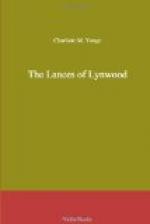“Oh, ho!” said Gaston. “The story now begins to wear some semblance of probability.”
Arthur turned, looking perplexed. “Master d’Aubricour,” said he, “I forgot that you were here. This is a secret which should have been for my uncle’s ears alone.”
“Is it so?” said Gaston; “then I will leave the room, if it please you and the Knight—though methought I was scarce small enough to be so easily overlooked; and having heard the half—”
“You had best hear the whole,” said Arthur. “Uncle Eustace, what think you?”
“I know not what to think, Arthur. You must be your own judge.”
Arthur’s young brow wore a look of deep thought; at last he said, “Do not go then, Gaston. If I have done wrong, I must bear the blame, and, be it as it may, my uncle needs must tell you all that I may tell him.”
“Let us hear, then,” said Eustace.
“Well, then,” said Arthur, who had by this time collected himself, “you must know that this Chateau Norbelle is one of those built by that famous Paladin, the chief of freebooters, Sir Renaud de Montauban, of whom you have told me so many tales. Now all of these have secret passages in the vaults communicating with the outer country.”
“The boy is right,” said Gaston; “I have seen one of them in the Castle of Montauban itself.”
“Then it seems,” proceeded Arthur, “that this Castle hath hitherto been in the keeping of a certain one-eyed Seneschal, a great friend and comrade of Sir Leonard Ashton—”
“Le Borgne Basque!” exclaimed both Knight and Squire, looking at each other in amaze.
“True, true,” said Arthur. “Now you believe me. Well, the enemy being in the neighbourhood, it was thought right to increase the garrison, and place it under the command of a Knight, and these cowardly traitors have wrought with my Lord of Pembroke and Sir John Chandos to induce the Prince to give you this post—it being their intention that this wicked Seneschal and his equally wicked garrison should admit Sir Oliver de Clisson, the butcher of Bretagne himself, through the secret passage. And, uncle,” said the boy, pressing Eustace’s hand, while tears of indignation sprang to his eyes, “the letter expressly said there was to be no putting to ransom. Oh, Uncle Eustace, go not to this Castle!”
“And how came you by this knowledge?” asked the Knight.
“That I may never tell,” said Arthur.
“By no means which might not beseem the son of a brave man?” said Eustace.
“Mistrust me not so foully,” said the boy. “I know it from a sure hand, and there is not dishonour, save on the part of those villain traitors. Oh, promise me, fair uncle, not to put yourself in their hands!”
“Arthur, I have taken the oaths to the Prince as Castellane. I cannot go back from my duty, nor give up its defence for any cause whatsoever.”
“Alas! alas!”
“There would be only one way of avoiding it,” said Eustace, “and you must yourself say, Arthur, whether that is open to me. To go to the Prince, and tell him openly what use is made of his Castles, and impeach the villains of their treachery.”




